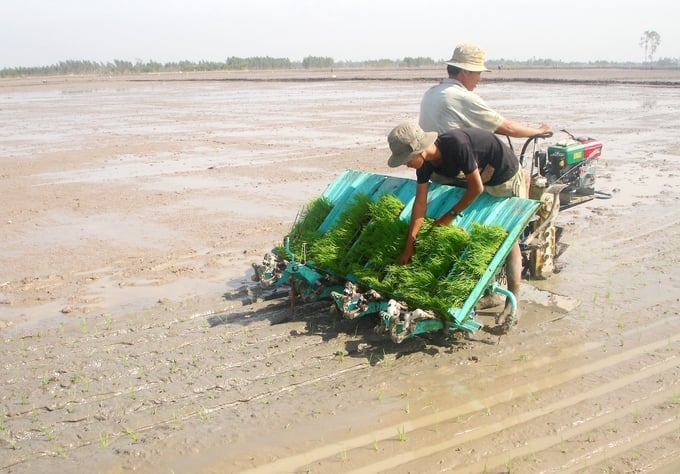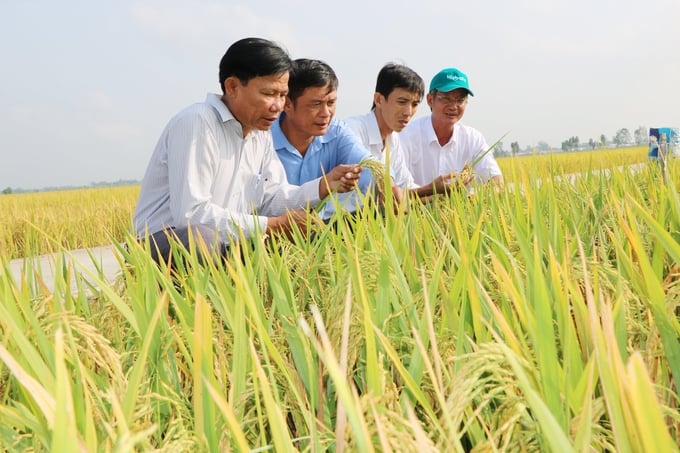May 29, 2025 | 16:39 GMT +7
May 29, 2025 | 16:39 GMT +7
Hotline: 0913.378.918
May 29, 2025 | 16:39 GMT +7
Hotline: 0913.378.918
After 7 years of implementation from 2015 to 2022), the Vietnam Sustainable Agriculture Transformation Project (VnSAT) is considered the most successful international cooperation model in agriculture as its results exceed the initial goals, bringing high economic efficiency, sustainability, and strong spillover effects.
According to the assessment, the VnSAT Project has reviewed industry restructuring projects and sub-projects, thematic plans and policies for restructuring, contributing to strengthening institutional capacity to support the implementation of restructuring for agencies and units under the Ministry of Agriculture and Rural Development, provinces, partners and networks in the value chain.
Specifically, 19,200 co-operatives and unions of cooperatives, 14,000 agricultural enterprises and 16.88 million farming households, accounting for 62.9 per cent of the country's population have benefited from the restructuring.

Farmers in the Mekong Delta have had major changes in rice cultivation thanks to the impact of the VnSAT Project. Photo: Trung Chanh.
The VnSAT project supported and created favorable conditions for districts, communes and farmer households to participate in training courses.
A total of 262,295 turns of people attended training courses on the technical process "3 decrease, 3 increase", "1 must 5 decrease".
A total of 84,411 turns of people attended training courses for sustainable coffee production and coffee re-cultivation.
A total of 39,298 turns of people attended training courses in 8 Mekong Delta provinces and 5 Central Highlands provinces. On average, 81.85 per cenr of the trainees have successfully applied their knowledge into actual production.
Thanks to the project, 876km of in-field roads were built, upgraded and put into use. 26km of canals, 47km of electricity lines of all kinds were provided to localities. 75 warehouses were built with total area of 51,248 sq.m.
Dryers-covering houses with total area of 20,828 sq.m and 34,050 sq.m of coffee drying yards were built.
A total of 27 paddy dryers, 58 coffee dryers, 19 straw rolling machines, 12 rice planting machines and other facilities and equipment have been put into operation effectively.
The project has also supported the construction of 51 nurseries and 360 water-saving irrigation models. It completed disbursement of all allocated credit capital worth US$105 million. The project also provided loans to 10 rice sub-projects and 5,642 coffee farmers in five Central Highlands provinces with a total area of 11,932ha.
To meet the aspirations of farmers, the local authorities participating in the VnSAT project have contributed to improving the qualifications, knowledge and skills of district, commune officials and participating households.

The water-saving irrigation models of the VnSAT project have helped farmers in the Central Highlands reduce production costs. Photo: Minh Quy.
Le Van Hien, Head of Agriculture Projects Management Board, Director of the Central VnSAT Project Management Board affirmed that the VnSAT project was a successful and high economically efficient model . The projects achived goals and gain participants’ trust and supports.
The participating households have gained more production experience, income and gradually have a sense of producing more competitive agricultural products. The project was proved to be economically viable with the overall EIRR coefficient for the whole project reaching 25.06 per cent.
VnSAT was evaluated as excellent for the following reasons. Regarding the project's goals, five development goals were achieved - exceeded the original target, with the target exceeding 150 per cent. Elevent intermediate goals of the project met and exceeded the planned ones.
Regarding component A, 14 projects, 6 sub-sectors and 7 pilot provinces have their policies and mechanism reviewed, which facilitated the agricultural restructuring, ensuring synchronized restructuring from central to local.

The VnSAT project has enhanced capacity in both infrastructure and governance for rice production cooperatives in the Mekong Delta. Photo: Le Hoang Vu.
For component B, the number of trainees exceeds the initial target. In particular, the project helps to raise awareness and change behavior for farmers in production as well as apply scientific and technical advances to rice production.
VnSAT also supported the establishment and consolidation of 308 farmers’ organisations, including 265 cooperatives and 43 cooperative groups, far exceeding the target of 148 farmer organisations. Investment in infrastructure and equipment has contributed to creating a premise for farmer organisations to develop production.
As for component C, the results of training on sustainable coffee farming and sustainable coffee replanting exceeded the initial target.
Up to 82.5 per cent of the intervened areas fully apply the criteria of the sustainable coffee production process and 81.2 per cent of the intervened areas apply correctly and fully the criteria of the sustainable replanting process. The incremental profit per hectare is 21.7 per cent compared to that before the project. Spending on fertilizer reduced by VND1.56 million per ha; pesticides VND 1.6 million per ha; irrigation water VND1.07 million per ha, labour VND1.65 million dong per ha.
Yield and quality increased equivalent toVND 4.6 million per ha. It is also important to raise awareness and change behaviour for farmers in production.
In addition, the project has completed piloting in five areas, and the research results have been accepted by the Ministry of Agriculture and Rural Development. There are 93 per cent of the project area applying the correct technical measures on economical irrigation, equivalent to 54,000 ha, reaching 245 per cent of the project's target - 22,000 ha. Investment in infrastructure and equipment has contributed to creating a premise for farmer organisations to develop production.

Few projects have been well received and implemented by farmers as effectively as the VnSAT Project. Photo: LHV.
For credit component, all of credit capital -US$105 million (VND2.413 trillion was disbursed early before the cut-off date (December 31, 2020). As of June 30, 2022, accumulated credit disbursement reached VND 2,863.48 billion, creating a total investment in the Central Highlands and Mekong Delta regions up to VND 5,417.08 billion.
Regarding chain linkage activities, up to now, about 74,000 hectares of rice have been linked in production and product consumption between farmers' organisations and enterprises.
ST24, ST25 rice products have been consumed in the northern provinces, especially Hà Nội and in some countries around the world. About 14,700ha of coffee were committed to be bought by businesses for consumption in Vietnam and other countries.
The approach, the design of the VnSAT Project, the link between the components, the restructuring of the agricultural sector are praised reasonable and in line with the policies of the World Bank and the Government.
Training courses for staff at all levels, for leaders of farmers’ organisations and for project farmers have contributed to raising awareness in production and applying scientific and technical advances to production. Businesses and farmers understand and access credit sources of the project to borrow capital from banks.

The Central Highlands coffee replanting programme bears the bold imprint of the VnSAT Project. Photo: Minh Hau.
The construction of infrastructure has become an important factor to create favorable conditions for production and market connectivity. The support in processing and post-harvest helps farmers’ organisations and farmers improve product quality and increase income.
The building and strengthening of farmers’ organisations contributes to the implementation of the Resolution of the 5th Plenum of the IXth Central Committee on continuing to innovate, develop and improve collective economic efficiency.
In addition, the coffee replanting activities of the VnSAT Project contribute to the implementation of the Coffee Replanting Project in the Central Highlands provinces for the period 2014 - 2020 and 2021 - 2025 of the Ministry of Agriculture and Rural Development.
Building a landscape coffee model and developing specialty coffee are breakthroughs that are in line with Vietnam’s orientation of increasing added value and sustainable development.
Seeing the results of the VnSAT Project implemented in the Mekong Delta and Central Highlands as well as the new requirements of Vietnam and the World Bank (WB), the WB met with the Ministry of Agriculture and Rural Development to discuss the content and methods of building “Project for developing low-carbon agriculture and green growth” with the idea of “Vietnam proposes a programme to reduce 9 million tons of greenhouse gas emissions in the agricultural sector” to ensure the commitment of the Government at COP 26 , achieving net zero emissions by 2050.
Translated by Hien Anh
/2025/05/25/4127-3-073637_820.jpg)
(VAN) Thanks to the promotion from an FAO-implemented project, vegetable production in greenhouses in Moc Chau has seen strong development, from 1.5 hectares in 2021 to nearly 50 hectares in 2024.

(VAN) FAO has recently supported USD 140,000 to implement the project 'Risk mitigation human-animal interface risks through disease control initiatives in pig farming.'

(VAN) The People's Committee of Tra Vinh province has approved an adjustment to the investment policy for the Green Hydrogen Plant project, increasing its area to approximately 52.76 hectares.
![Reducing emissions from rice fields: [2] Farmers’ commitment to the soil](https://t.ex-cdn.com/nongnghiepmoitruong.vn/608w/files/news/2025/05/05/dsc08881jpg-nongnghiep-140632.jpg)
(VAN) Clean rice cultivation model in Thuong Tan commune, Bac Tan Uyen district, is assisting local residents in achieving sustainable agriculture by substantially reducing costs, increasing productivity, and protecting the environment.

(VAN) At the conference to disseminate Resolution No. 68, AgriS introduced its digital agricultural ecosystem and reaffirmed its commitment to accompanying the Government in promoting private sector development and sustainable agriculture.

(VAN) 'Blue Ocean - Blue Foods' initiative is designed to restore marine ecosystems and establish sustainable livelihoods for local communities by cultivating a minimum of 1,000 hectares of cottonii seaweed in the first three years.
/2025/05/21/4642-3-112707_603.jpg)
(VAN) The V-SCOPE project has made direct contributions to three out of six pillars of the Comprehensive Strategic Partnership between Vietnam and Australia.